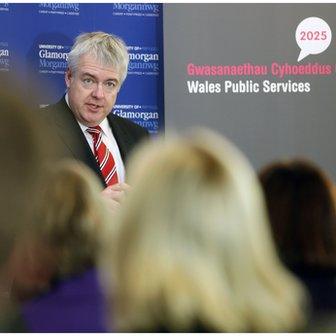How many more David Pritchards?
- Published
- comments

"No change, no chance" - Carwyn Jones' message to Wales' public services
"No change - no chance". The First Minister was being asked whether his government - and the public sector in Wales really had the stomach for the kind of reforms needed over the next decade and beyond.
Carwyn Jones was clear. Perhaps others, elsewhere in the UK might see Wales as a "bunker" resistant to reform, but that was simply not true.
The difference, he told this morning's public services conference, external, was that his government would change the public sector, drive collaboration and efficiency from within, rather than bring in the private sector to shake things up from without.
His opponents, principally the Welsh Conservatives, just don't get this. For them, the counter-argument is equally clear. If the private sector can deliver the same service or better, at the same value for money or better - then why not use it? The average citizen, they say, doesn't share Carwyn Jones' antipathy to businessmen if they get treated quicker.
The problem for the Tories is that private sector involvement in public services is getting a bit of a tough press at the moment, with the Southern Cross care home debacle high on the list.
Carwyn Jones chose as his case study, unsurprisingly, the English health service legislation currently making its tortuous way through Parliament, perhaps mindful of David Cameron's sideswipe at the performance of the Welsh health service at PMQs yesterday.
Incidentally, there's something of an irony of democratic accountability that virtually every time the Welsh Conservatives challenge Carwyn Jones over the Welsh NHS, he retorts by attacking the English NHS, and almost every time the English Labour party attacks David Cameron on the English NHS he responds by dismissing Welsh Labour's record on the Welsh NHS. Suits both sides in a way - but what the voters get out of it is perhaps another question.
Time for another case study, this time hopefully an apposite one.
Yesterday I met David Pritchard, at his home in Monmouth. He went into hospital last autumn and had to have his left leg amputated. His story of forgetting it had gone - and attempting to pick up his good leg in order to put on his trousers - was suggestion enough that he's not the sort of man to wallow in self pity. He's fit and recovered fairly quickly from the operation - but found himself stuck in his bed for seven weeks because his house wasn't equipped for him to return.
It's fair to say he felt the medical staff made it pretty clear ,too clear for his liking, that his bed was needed for other patients. He was equally keen to be out but no agency seemed able to tell him how to go about getting the changes needed. So he was stuck.
His wife Marlene was preparing to spending Christmas alone when social housing group Care and Repair Cymru, who are carrying out a pilot project in Monmouthshire, intervened. According to the Pritchards, they sat down on the Monday to find out what was needed, put in the order for a stairlift on the Tuesday, it was fitted on Thursday, and David was home - before Christmas - on the Friday.
The point is this. Estimates of how much it costs per patient per night in a Welsh hospital vary but it runs into hundreds of pounds. David's stay was a classic case of bed blocking but the health service, it seems, wasn't able to point him in the right direction for getting the changes needed for him to leave. So their bill was rising further and further. It took cash from another pot - housing - to get him out of hospital, thereby saving the NHS hundreds or even thousands of pounds.
Care and Repair estimate that for every one pound they spend, other public services are saved £7.50. That's not to say that the chief executive of the local health board suddenly has seven pounds fifty more in his pocket to spend but he certainly would have spent an awful lot more had David's stairlift taken another seven weeks to be fitted.
And that's the challenge. How many more David Pritchards are there out there, not just in the health service but receiving services that they don't want, that cost money, but they wouldn't need if someone working for another part of the public sector was aware and willing to help?
The idea of creating an Institute of Welsh Public Policy to challenge government thinking and gather ideas will fire up some. Others, including one who must 'deliver' services every day responded with a weary "A Welsh Ideas Institute? Truly I weep for the future."
The danger with the collaboration agenda is that it's been around as political rhetoric for so long, it's in danger of being old hat before it ever came about.
Wales doesn't have any missiles but it sure as anything has a lot of silos.